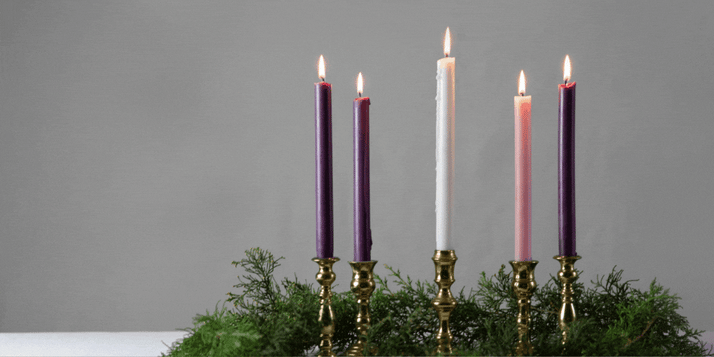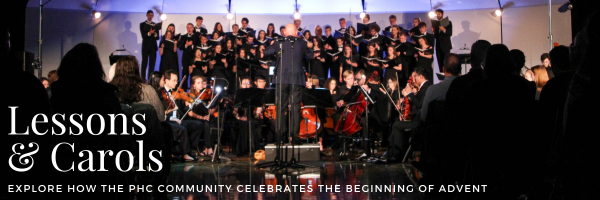
PHC students are serious about the Christian life, and celebrating traditional Advent is just one example.
“It’s helpful because we think we’re way more focused than we actually are,” senior Natalie Symons said. “You’re so weak. You actually need structure to things and need to be directed toward what is good.”
Read about spiritual life at PHC
Advent begins on the Sunday closest to November 30 and ends on December 24, and the early church practiced deliberately preparing for Christ’s coming during this time. Over the centuries, various churches have introduced different traditions, including fasting and lighting candles—representing hope, peace, joy, and love—often accompanied by specific devotions.
PHC campus' celebration of Advent culminates in the annual Lessons & Carols service, but many students continue to practice traditions on their own.
Symons compared Christmas to Easter, which has a deliberate period of preparation. “Traditionally, Advent has been viewed in the same way as lent,” she said. “You fast and you wait expectantly for the birth of Christ and the coming of Christ.”
Fasting during Advent is a form of devotion that includes prayer and contemplation about the need for a savior. “The purpose of a fast is to remind you that you do not sustain yourself,” she said. “You actually need Christ to make you whole. And you need His sacrifice for you. And you on your own cannot do that.”
Symons and her husband light Advent candles at home and typically read accompanying passages from Scripture, as well as from the Book of Common Prayer and The Imitation of Christ by Thomas à Kempis. They also follow the tradition of fasting from meat on Fridays and from food on Wednesdays, and they feast on the feast days of different saints. “Our God is the true God, and He actually saved the world, so why wouldn’t we feast? And also simultaneously, why wouldn’t we fast in recognition of our own need for him?” she said.
Junior Logan Crockett said that he recently learned how Advent is significant because it points to the second coming of Christ as much as it does to the first. “Advent just means ‘to come,’” he said, “although it’s focused on Christmas, since Christmas has already happened, it’s also calling Christians to focus on when Christ will come again, as in a preparation for his second coming.”
Crockett started celebrating traditional Advent last year by reading On the Incarnation by Athanasius, following a reading plan sent to PHC students by Dr. Mark Mitchell. In his work, Athanasius is refuting 1st-century idolatry by explaining the mystery of Christ’s divinity and humanity. “I can’t wait to read more and remember what I read last year,” Crockett said. “It was a huge blessing.”
Celebrating Christmas after reading On the Incarnation held a deeper meaning for Crockett. “I just felt like I knew Christ better,” he said. “It just reminded me that [the incarnation] really happened and it was real, and it was strange. It’s not something that false gods do, it’s something a real God did, and I think a lot of people kind of miss it.”
Like Symons, Crockett pointed out the importance of the reminders Advent brings. “Humans are forgetful,” he said. “We forget God’s promises, we forget what He’s done, so there’s also something really special about ways Christ’s church has created to remember special events of Christ’s life.”
He said it’s good to be reminded of what Christmas really is amidst the bells, twinkling lights, and other beautiful elements. “Although these things are wonderful, I think Advent is a specifically Christian way to anticipate Christmas, and that’s what makes it special,” Crockett said.
--
Patrick Henry College exists to glorify God by challenging the status quo in higher education, lifting high both faith and reason within a rigorous academic environment; thereby preserving for posterity the ideals behind the "noble experiment in ordered liberty" that is the foundation of America.

.png?width=800&height=400&name=PHC%20(1).png)

